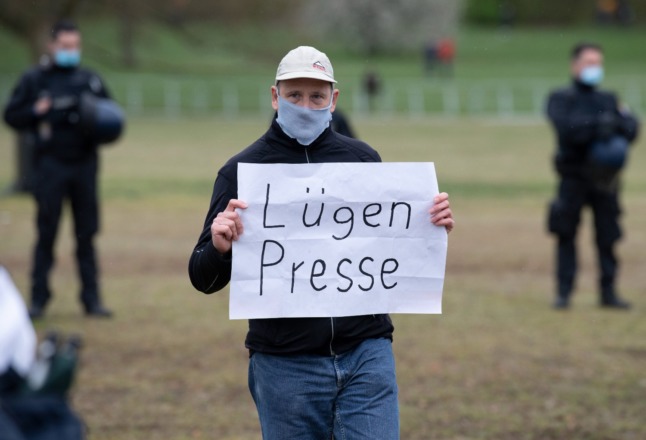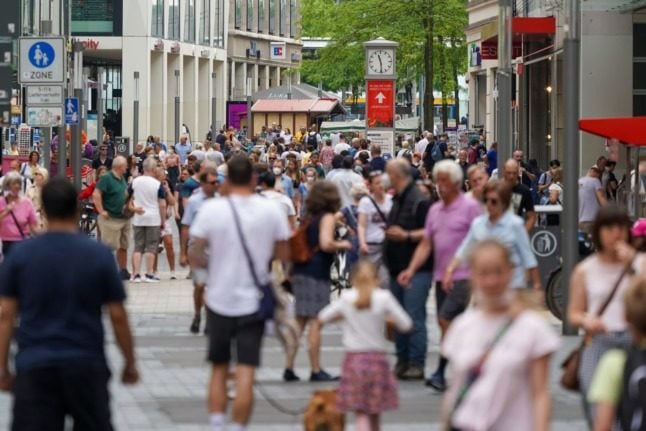It is common knowledge that Soviet-era Russian words were adapted for use in the lexicon of former communist East Germany – the GDR, just as Americanisms abounded in West Germany. Eastern words like Kosmonaut (meaning ‘astronaut’, from the cyrillic: космонавт) and Subbotnik (a day of unpaid volunteer work on a Saturday; cyrillic: субботник) attest to the role that this new jargon played in sustaining a sense of identity and relationship with the rest of the Eastern Bloc.
Aside from loan words, cultural factors also influenced the vocabulary used in the GDR. Words with religious connotations were adapted to reflect the state’s interest in atheism, while long technical terms started to saturate everyday life. However, following reunification these words largely lost their meaning and function, and nowadays sound strange to modern German-speakers from eastern Germany.
READ MORE: How the German language differed between East and West
But this does not mean that language became immediately standardised as soon as the wall fell. Some linguests say an ‘invisible border’ still differentiates language usage and vocabulary in western Germany from the country’s eastern states – Brandenburg, Mecklenburg-Western Pomerania, Saxony, Saxony-Anhalt, and Thuringia, plus East Berlin.
How do the differences in language impact on identity?
Some of these differences centre on food: what western German speakers call ‘Pfannkuchen’ (pancakes or doughnuts in Berlin) are often called ‘Eierkuchen’ by people from eastern Germans; what is called ‘Frikadelle’ (a traditional meat dish resembling meatballs) for the former is ‘Bulette’ in the latter.
Then there’s the actual products that different in the east when it was a different country. For example ‘Nudossi’ (which is still widely available today) is the eastern version of the chocolate-hazelnut spread ‘Nutella’.
But time is also sometimes expressed differently: where in the north of the old West Germany you might use ‘viertel nach neun’ (quarter past nine) to express 9.15, in near enough all former GDR regions the same time is expressed as ‘viertel zehn’ (quarter ten).

In a Guardian article on the subject from 2019, Professor Adrian Leeman of the University of Bern highlighted that “vernacular language is evidently a marker of identity that people wear with pride.” He suggests that eastern Germans gain understanding of and affirm their identity through language, something which many felt was erased when the wall fell.
This sense of regional identity as mediated through language was damaged after reunification. Whilst around 2,000 to 3,000 words from the former West Germany are thought to have been adopted into the gesamtdeutsche (all-German) lexicon, including obvious loan words such as ‘Kids’ and ‘Outfit’, it is estimated that only 14 words from the former East Germany made it into the national vernacular post-reunification.
READ ALSO: How big is the divide between eastern and western states?
And while some of these language changes were relatively innocent, having little impact on the lives of those from the former German Democratic Republic, words denoting concepts which were unfamiliar to those from the east were harder to grapple with.
The Deutsches Historisches Museum recalls how many East Germans struggled with having to learn words such as ‘Lohnsteuerjahresausgleich’ (the annual adjustment of income tax) and ‘Sozialversicherungsnummer’ (social security number), which were not only new words, but referred to institutions and procedures which had not existed in the GDR. New language did not only denote new ways of communicating, but an entirely new way of life.

The challenge of adapting to new vocabulary was such that the German Studies Institute at Martin Luther University Halle-Wittenberg had to set up a language advice line in 1993 which was disproportionately used by people from the former East Germany.
How did the media and some attitudes in the west impact the east?
Media depiction of eastern Germany, particularly by outlets based in western cities, has often been damaging and generalising, harming eastern Germans’ self-image. In 2019, Der Spiegel infamously provoked irritation after it ran a story titled ‘So isser, der Ossi’ (roughly translating as ‘What the Ossi is like’), which was accused of stereotyping, prejudice and high-handedness.
This sense of high-handedness has long been a persistent theme in eastern slang words which centre around the relationship between the former GDR and former FRG post-reunification.
This is reflected in the term ‘Besserwessi’, named German Word of the Year in 1991, which refers to a ‘Wessi’ (old slang term for someone from the former West Germany) who views themselves as superior to people from the former East Germany (‘Ossi’). It puns on the word ‘Besserwisser’, meaning ‘know-it-all’.
In response, former East Germans coined the term ‘Jammerossi’ (‘East German whinger’), pejoratively referring to those who criticised the difficulties and hardships of adapting to reunification. These words concretised the pervasive sense of separate identity between east and west.
READ MORE:
- Talkin’ bout my generation: What unity means to eastern Germans
- ‘The wounds still hurt today’ despite progress
An indignant attitude to the perceived condescension of former West Germans is also conveyed in the term ‘Di-Mi-Dos’ (Tuesday-to-Thursday commuters), still used to this day, which denotes the westerners who set up in the east of Germany for work purposes but travel back ‘home’ for long weekends and holidays in the west. They are sometimes seen as ‘implants’ who make little effort to properly assimilate in the east, but who often inhabit a disproportionate number of top positions in many industries.
This term also correlates with and points to wider patterns of professional and legal inequality between those from eastern and western Germany. As a recent study pointed out, even now only 1.7 percent of top or leading positions in politics, law, the military and business are held by eastern Germans, even though they amount to 17 percent of the population.
‘Manipulation and misuse’ of language
This pervasive sense of inequality also has a sinister import, with increasing divergence and even polarisation of voting patterns between east and west. Far-right parties such as the AfD (Alternative for Germany) have consistently polled much higher in eastern German states, particularly southeastern ones, which are much more traditionally conservative. However, support appears to have been waning somewhat in recent years.
Author John Kampfner says in his book Why the Germans Do it Better that manipulation and misuse of language are also key components of the political inventory of far-right groups such as the AfD. They have appropriated a number of distinctive buzzwords such as ‘abgehängt’ (left-behind, referring to those left behind by increasingly forward-thinking government policy) and ‘Lügenpresse’ (lying press), many of which are shamelessly appropriated from Nazi-era propaganda.

Such an approach brazenly attempts to tap into the sense of identity and solidarity offered by a common lexicon, something which was destabilised by reunification.




 Please whitelist us to continue reading.
Please whitelist us to continue reading.
Member comments